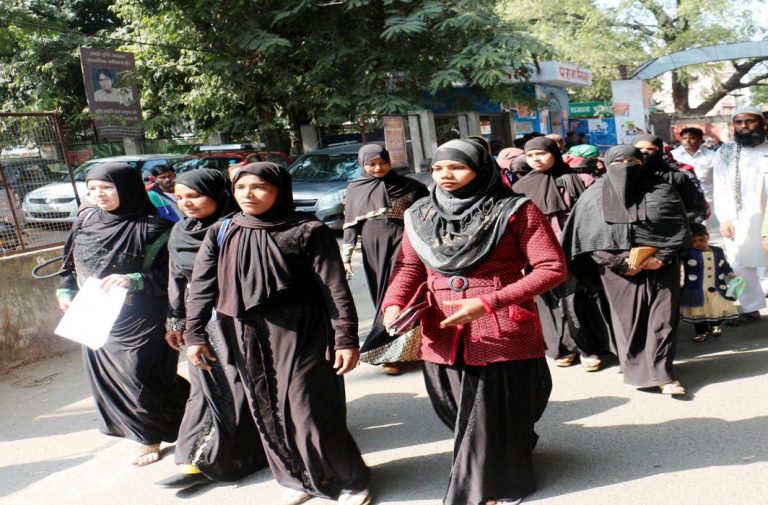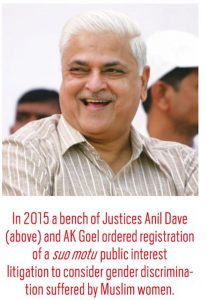
Above: Muslim women in a district court/Photo: UNI
Muslim women may be emboldened by the triple talaq verdict but two new petitions against polygamy and nikah halala reveal that they still face discrimination and threat to their marital status
By Vinay Vats
Between the Supreme Court verdict on triple talaq and the Modi government’s subsequent Muslim Women (Protection of Rights on Marriage) Bill, it was assumed that centuries of discrimination and subjugation by the more regressive-minded male members of the community had come to an end.
Certainly, it has given official and judicial authority to punish and deter husbands who indulge in the barbaric practice of instant divorce from a wife by uttering talaq three times, but it has failed to do the same regarding two other abhorrent practices, namely, polygamy and nikah halala. Both these are outside the purview of the Muslim Women Bill and now two petitions, filed recently, seek to redress this glaring omission.
The petitions in the Supreme Court against the practices of polygamy and nikah halala have been filed by two advocates—Ashwini Kumar Upadhyay and Archana Pathak Dave. In the triple talaq case, the apex court held that Section 2 of the Muslim Personal Law (Shariat) Application Act, 1937, which talks about triple talaq, is unconstitutional and violative of Articles 14, 15 and 21 of the Constitution of India. In the latest petitions, the advocates have asked that triple talaq be declared “cruelty” under Section 498A of the Indian Penal Code 1860, nikah halala be considered “rape” under Section 375 of the IPC, 1860, and polygamy an “offence” under Section 494 of the IPC, 1860.
 Under Muslim Personal Law, polygamy still enjoys socio-religious sanction. Even in more affluent sections of Muslim society in urban areas, there are cases of Muslim men being married to two women simultaneously. Polygamy was declared illegal in India in 1956, except for Hindus in Goa where it is legal, and for Muslims who are permitted to have four wives.
Under Muslim Personal Law, polygamy still enjoys socio-religious sanction. Even in more affluent sections of Muslim society in urban areas, there are cases of Muslim men being married to two women simultaneously. Polygamy was declared illegal in India in 1956, except for Hindus in Goa where it is legal, and for Muslims who are permitted to have four wives.
On February 10, 2016, the Supreme Court ruled that polygamy was not an integral part of Islam and justified the sacking of an Uttar Pradesh government employee for violating service rules following his marriage to a second woman. Justices TS Thakur and AK Goel stated: “What was protected under Article 25 (right to practice and propagate any religion) was the religious faith and not a practice which may run counter to public order, health or morality. Polygamy was not an integral part of religion and monogamy was a reform within the power of the State under Article 25.” The court stated that it was considering banning polygamy.
The current petitions filed by the two advocates date back to 2015 when a bench of Justices Anil Dave and AK Goel ordered registration of a suo motu public interest litigation to consider gender discrimination being suffered by Muslim women under the practice of triple talaq.
Thereafter, that bench also sought a reply from the centre on a question as to why “gender discrimination suffered by Muslim women should not be considered a violation of the fundamental rights under Articles 14, 15 and 21 of the Constitution and international covenants.’’ That brought up the practice of nikah halala. Under it, if a Muslim man wants to take back a wife he has divorced under triple talaq, she cannot go back to her former husband unless she marries another person, even for a brief period, consummates that marriage, and gets a divorce from him. The stricture to do with sex with another man merely to obtain religious sanction to remarry a former husband is what is so controversial. As the Court observed: “We can say that the failure to secure equal rights for both men and women under this religion violates their fundamental rights and human dignity which adversely affect their social and economic status in society.’’
Other Muslim countries have got around such regressive personal laws. In Pakistan, polygamy is legally allowed but with a number of restrictions which makes it more evolved than among Indian Muslims. To marry again, the husband has to obtain the consent of the earlier wives/wife and also has to prove his capability to take care of them financially. Also, a talaq notice has to be in writing and a husband cannot give talaq to a pregnant wife.
India still lags behind, largely because of political expediency and lack of consensus. In 2015, the government had constituted a committee titled “Woman and the Law: An assessment of Family Laws which focus on laws relating to Marriage, Divorce, Inheritance and Succession”. It recommended a ban on many practices, including talaq-e-bidat and polygamy. Not much progress has been seen since.
Former Chief Justice of India JS Khehar had observed in Shayara Bano versus union of India and others that the issue of polygamy and nikah halala will be dealt with separately. The two petitions filed in the Supreme Court for final adjudication offer an opportunity to make good on that promise. They will also address the issue of whether personal laws are violative of the Constitution of India or of the fundamental rights enshrined under Articles 14, 15 and 21.

